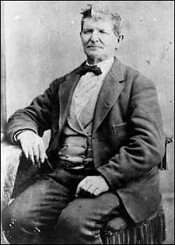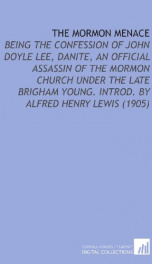Lee John Doyle

John Doyle Lee (September 12, 1812 – March 23, 1877) was a prominent early Latter-day Saint (LDS or Mormon) who was executed for his role in the Mountain Meadows massacre. Lee was born in Kaskaskia, Illinois Territory and joined The Church of Jesus Christ of Latter-day Saints (LDS Church) in 1838. He was a friend of Joseph Smith, Jr., founder of the LDS Church. In 1839, Lee served a Mormon mission with his boyhood friend, Levi Stewart. Together they preached in Illinois, Ohio, Kentucky, and Tennessee. During this period Lee converted and baptized "Wild Bill" Hickman. Lee practiced plural marriage and had nineteen wives (at least eleven of whom eventually left him) along with sixty-seven children. He was allegedly a member of the Danites, although this has been disputed. He was an official scribe for the Council of 50, a group of men who, in the days of Joseph Smith, Jr. and Brigham Young, worked together to provide guidance in practical matters to the church, specifically concerning the move westward out of the United States of America to the Rocky Mountains. After Smith's murder, Lee joined the bulk of the LDS Church's members in what is now Utah and worked towards establishing several new communities. A successful and resourceful farmer and rancher, in 1856, Lee became a US Indian Agent in the Iron County area, assigned to help Native Americans establish farms. In 1858 Lee served a term as a member of the Utah Territorial Legislature. Following church orders in 1872, Lee moved from Iron County and established a heavily-used ferry crossing on the Colorado River. The site is still called Lee's Ferry. The ranch was named the Lonely Dell Ranch and is now listed on the National Register of Historic Places, together with the ferry site. In September 1857, the Fancher party, an emigrant group from Arkansas, camped at Mountain Meadows, a staging area in southern Utah used to prepare for the long crossing of the Mohave desert by groups traveling to California. They were attacked by a group of Mormon militiamen dressed as Native Americans. After a siege, Lee approached the Fancher encirclement and convinced the emigrants to surrender their weapons and property to the Mormons in return for safe conduct to nearby Cedar City, whereupon approximately 120 of the Fancher party were killed by Mormon militia, leaving only about 17 small children as survivors. William Ashworth notes in his autobiography that after the massacre, that the "leaders among the white men had bound themselves under the most binding oaths to never reveal their part in it." Lee told Brigham Young that the Indians had been solely responsible, that "no white men were mixed up in it."[1] Lee later maintained that he had acted under orders from his military leaders, under protest. Lee remained active in Mormonism and local government for several years. In 1874, he was arrested and tried for leading the massacre. The first trial ended in a hung jury, but he was tried again in 1877 and sentenced to death. Lee never denied his own complicity, but claimed he hadn't personally killed anyone. He said he had been a vocally reluctant participant and later a scapegoat meant to draw attention away from other Mormon leaders who were also involved. Lee further maintained that LDS President Brigham Young had no knowledge of the event until after it happened. However, in the Life and Confessions of John D. Lee he wrote, "I have always believed, since that day, that General George A. Smith was then visiting southern Utah to prepare the people for the work of exterminating Captain Fancher's train of emigrants, and I now believe that he was sent for that purpose by the direct command of Brigham Young."[2] On March 23, 1877, Lee was executed by firing squad at Mountain Meadows on the site of the 1857 massacre. His last words included a reference to Young: "I do not believe everything that is now being taught and practiced by Brigham Young. I do not care who hears it. It is my last word... I have been sacrificed in a cowardly, dastardly manner."[3] In April 1961, The Church of Jesus Christ of Latter-day Saints posthumously reinstated Lee's membership in the church.[4] According to Morris K. Udall's book Too Funny to be President and the documentary film The West, John D. Lee was Udall's great-grandfather.
do you like this author?
What readers are saying
What do you think? Write your own comment on this book!
write a commentWhat readers are saying
What do you think? Write your own comment on this author!
write a commentBook list

The Mormon MenaceThe Confessions of John Doyle Lee,Danite
Series:
Unknown
Year:
Unknown
Raiting:
4/5
Show more
add to favoritesadd In favorites

mormonism unveiled or the life and confessions of the late mormon bishop john
Series:
Unknown
Year:
Unknown
Raiting:
4/5
Show more
add to favoritesadd In favorites

mormonism unveiled including the remarkable life and confessions of the late m
Series:
Unknown
Year:
Unknown
Raiting:
5/5
Show more
add to favoritesadd In favorites
Book list

The Mormon MenaceThe Confessions of John Doyle Lee,Danite
Series:
Unknown
Year:
Unknown
Raiting:
4/5
Show more
add to favoritesadd In favorites

mormonism unveiled or the life and confessions of the late mormon bishop john
Series:
Unknown
Year:
Unknown
Raiting:
4/5
Show more
add to favoritesadd In favorites

mormonism unveiled including the remarkable life and confessions of the late m
Series:
Unknown
Year:
Unknown
Raiting:
5/5
Show more
add to favoritesadd In favorites

The Mormon Menace
Series:
Unknown
Year:
Unknown
Raiting:
3/5
Originally published in 1905. This volume from the Cornell University Library's print collections was scanned on an APT BookScan and converted to JPG 2000 format by Kirtas Technologies. All titles scanned cover to cover and pages may include marks notations and other marginalia present in the original volume.
Show more
add to favoritesadd In favorites
What readers are saying
What do you think? Write your own comment on this author!
write a commentif you like Lee John Doyle try:
readers also enjoyed
What readers are saying
What do you think? Write your own comment on this author!
write a commentGenre
if you like Lee John Doyle try:
readers also enjoyed
Do you want to read a book that interests you? It’s EASY!
Create an account and send a request for reading to other users on the Webpage of the book!

